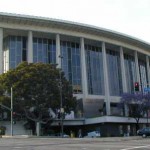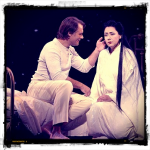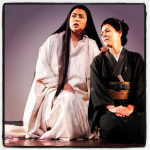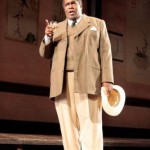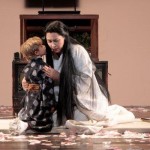B.F. Pinkerton: Brandon Jovanovich
Suzuki: Milena Kitic
Sharpless: Eric Owens
Goro: Rodell Rosel
Bonze: Stefan Szkafarowsky
Prince Yamadori: Museop Kim
Kate Pinkerton: D’Ana Lombard
Imperial Commissioner: Gabriel Vamvulescu
Official Registrar: Hunter Phillips
Conductor: Grant Gershon
Director: Ron Daniels
Scenic and Costume Designer: Michael Yeargen
Lighting Designer: Stephen Strawbridge
I arrived at the Music Center full of excitement for this performance. Madama Butterfly was the second opera that I was ever exposed to, I’ve always adored it, and not since I was 14 had I seen it onstage in a traditional production. I never cared for the Robert Wilson production that graced the LA Opera stage from 2004 until now: I understand its merits (stripping away unnecessary business, emphasizing the music and Butterfly’s inner journey), but still, I like opera characters to be people, not rigid symbolic puppets. So I was overjoyed to hear that this season a traditional Butterfly would be imported from the San Francisco Opera.
The production, 15 years old but still beautiful, didn’t disappoint me. While Puccini and the librettists would probably have considered it a radical production, by today’s standards it was a conservative one, yet still wonderfully effective with unique charms and fresh emotional insight. Michael Yeargen’s unit set consisted of a tall wooden framework with massive sliding shoji screens. The backdrop was a simple scrim that served as a canvas for lighting effects and projections, such as the starry sky that Butterfly rhapsodized over in the Love Duet (as all the while, Pinkerton tried to lead her to a prominently-placed marriage bed), and most dramatically, the arrival of Pinkerton’s ship at the climax of Act II, Part I. The handsome costumes were traditional Japanese and Edwardian Western dress, and as in many modern Butterflies, kabuki-style stagehands in black garb and veils were present to open and close the shoji as needed, bring flowers for the Flower Duet, and so on.
At the same time, some aspects of the staging were innovative even by modern standards. For example, instead of romanticizing the two-women-and-a-baby household on the flowery hilltop, this was the first Butterfly ever to make me fully feel the desperate sadness and poverty of Cio-Cio-San’s home in Act II. The shoji, elegant and flowery in the first act, became faded and tattered in the second, as well as covered with photos of American landmarks and Japanese/English flashcards. Suzuki was shown pawning furniture, while Butterfly, far from the securely hopeful figure of some productions, was already a broken bird at the start of the act, sprawled on the floor in an opium trance, pipe in hand.
Furthermore, in some ways the production innovated just by going back to oft-ignored tradition. The Humming Chorus and Intermezzo (with no intermission between them) contained no ballet, no dream sequence… just Butterfly standing like a statue, watching for Pinkerton, as the lighting changed from sunset, to night, to dawn, to morning, as Puccini intended. And it worked beautifully. Butterfly’s suicide was likewise staged with no excess melodrama: she simply stabbed herself, reached out to her blindfolded child and collapsed, while the backdrop turned blood red and the kabuki figures bowed their heads in respect for the dead. I’ll admit, the staging wasn’t always perfect – characters tended to be left standing aimlessly when they weren’t singing and I wished the Love Duet had been more pas de deux-like and less park-and-bark. But overall, this was an excellent production, old-fashioned in the best possible way, yet just inventive enough to keep me emotionally involved.
At this dress rehearsal, the production itself was the highlight for me, more than any of the performers. Which certainly isn’t to say that the cast was bad. The best term I can think of to describe them is “solid.” Not spectacular, but good. Oksana Dyka worried me slightly at first: she was a dramatic-voiced Butterfly a la Tebaldi, when I tend to prefer the more lyric types, and her entrance was fairly piercing. But before long I fell under the spell of her luxurious tone. Her three arias were magnificently sung. I wouldn’t call her an outstanding actress (I’ve been spoiled by the likes of Patricia Racette in the Met HD Simulcast and of Callas and Scotto on CD), but still she conveyed all the necessary emotions, particularly shining in the agony of the final scene, and commanded the stage yet never lacked vulnerability. My favorite singer of the day, though, was Brandon Jovanovich as Pinkerton. At first I thought his voice might be too dark and monotonously loud, but it proved to be a very handsome instrument fully up to the demands of the music. What’s more, he looked every inch the strapping young American officer (it was no wonder that Butterfly fell for him!) and was a natural, believable actor. The loud boos he received at the curtain call were obviously for the character, not for him.
Milena Kitic, whose Carmen I remember enjoying back in 2004, was a vocally beautiful Suzuki, though I thought she lacked emotion. Eric Owens was an effective, if not particularly memorable Sharpless: not that many baritones are memorable in the role. Rodell Rosel was an appropriately slimy Goro (Suzuki and Butterfly’s Act II assault on him was particularly justified in this staging, as he tried to physically attack Butterfly’s child in anger at her refusal of Yamadori), and the supporting singers were strong throughout. I worried that Grant Gershon’s conducting would be too slow at first, but ultimately he did complete justice to the luxurious passion of the score.
Overall, this was a solid Butterfly with outstanding elements. The singers’ performances were slightly routine, yet good, and the production was lovely. I’d love to see the same staging again with a different cast. (I know that the San Francisco Opera filmed this production in HD with Jovanovich’s Pinkerton and the magnificent Patricia Racette as Butterfly, Donald Runnicles conducting – please, please, PLEASE, SF Opera, release that one on DVD!) But I have no regrets about this performance whatsoever. I was just happy to see a well-performed and unabashedly traditional Butterfly onstage for the first time in eleven years. I wholeheartedly recommend this production to every LA Puccini lover.




